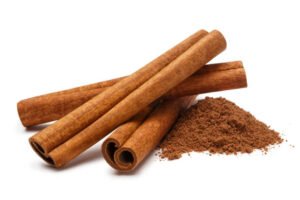The Benefits of Cinnamon for Diet and Health: Flavor and Wellness Advantages

Cinnamon, with its enticing aroma and therapeutic qualities, has been used for centuries in both culinary and traditional medicine. Beyond its delicious taste, cinnamon offers a range of impressive benefits for our diet and overall health. This nutrient-rich spice has gained popularity among those interested in a healthy lifestyle and balanced nutrition. Here are some of the remarkable benefits cinnamon brings to our diet and health.
Blood Sugar Control
Cinnamon is renowned for its ability to help regulate blood sugar levels, making it a valuable dietary addition, especially for individuals with type 2 diabetes. This spice works by improving insulin sensitivity, which is crucial for optimal glucose absorption into cells. By enhancing the efficiency of insulin, cinnamon helps in reducing the spikes and dips in blood sugar levels that can lead to health complications.
Adding a moderate amount of cinnamon to your diet can be particularly beneficial in maintaining stable blood sugar levels. Studies have shown that cinnamon can decrease the amount of glucose that enters the bloodstream after a meal. It achieves this by interfering with numerous digestive enzymes, slowing the breakdown of carbohydrates in the digestive tract. Additionally, compounds in cinnamon may act on cells by mimicking insulin, which further enhances glucose uptake.
For those with type 2 diabetes, incorporating cinnamon into their daily regimen can be a simple yet effective strategy to manage blood sugar levels. However, it is essential to use cinnamon as a supplement to, and not a replacement for, other diabetes treatments. As always, it is advisable to consult with a healthcare professional before making significant changes to your diet or diabetes management plan.
Metabolism Boost and Weight Management
Cinnamon may have a positive effect on metabolism and contribute to weight control. Research suggests that consuming cinnamon can enhance fat burning and stimulate metabolism, leading to more efficient calorie utilization. Additionally, cinnamon can curb cravings for sweets and help control appetite, which can be helpful for managing body weight.
One of the key benefits of cinnamon for diet and health is its ability to boost metabolism. Cinnamon contains compounds that can increase thermogenesis, the process by which the body produces heat and burns calories. By enhancing thermogenesis, cinnamon helps the body utilize calories more efficiently, which can be particularly beneficial for those looking to maintain or reduce their weight.
Cinnamon’s impact on fat burning is another significant aspect of its metabolic benefits. Studies have shown that cinnamon can influence fat cells by promoting the breakdown of fat and reducing the storage of new fat. This dual action makes it easier for the body to use stored fat as energy, contributing to overall weight loss efforts.
Suppressing Appetite
Cinnamon’s ability to suppress appetite is one of its most valuable benefits for diet and health. The fiber content in cinnamon plays a crucial role in helping you feel fuller for longer periods. This prolonged sense of satiety can significantly reduce overall food intake. When added to meals, cinnamon can help curb hunger pangs and prevent overeating, which is essential for maintaining a calorie deficit necessary for weight loss.
By integrating cinnamon into your daily diet, you can harness its appetite-suppressing properties to support your weight management goals. This can be particularly beneficial for those striving to reduce caloric intake without feeling deprived. Moreover, the natural sweetness of cinnamon can help satisfy sugar cravings, reducing the temptation to indulge in high-calorie, sugary snacks.
Enhancing Exercise Performance
In addition to its culinary appeal and health benefits, cinnamon can also play a pivotal role in optimizing exercise performance. By improving blood flow and boosting oxygen levels in the blood, cinnamon facilitates enhanced physical performance, thereby contributing to more effective workouts and aiding in weight loss efforts.
Cinnamon has been shown to promote better circulation throughout the body. This enhanced blood flow ensures that vital nutrients and oxygen reach the muscles more efficiently during exercise. As a result, individuals may experience improved endurance, reduced fatigue, and enhanced overall performance during physical activities.
Another notable benefit of cinnamon is its ability to increase oxygen levels in the blood. This heightened oxygenation can significantly impact exercise performance by improving aerobic capacity and delaying the onset of fatigue. With sufficient oxygen supply to the muscles, individuals can engage in more strenuous activities for longer durations, leading to greater calorie expenditure and enhanced fitness levels.
Lowering Bad Cholesterol
High levels of bad cholesterol (LDL) can impede weight loss efforts. Cinnamon has been shown to lower LDL cholesterol levels while maintaining or increasing good cholesterol (HDL) levels. This not only supports heart health but also enhances the overall effectiveness of a weight loss diet.
LDL cholesterol, often referred to as “bad” cholesterol, can accumulate in the arteries, leading to plaque buildup and increasing the risk of heart disease and stroke. Incorporating cinnamon into your diet can help lower LDL cholesterol levels, reducing the risk of these serious health conditions.
HDL cholesterol, or “good” cholesterol, plays a crucial role in removing LDL cholesterol from the bloodstream, thereby preventing the buildup of plaque in the arteries. Cinnamon has been found to maintain or even increase HDL cholesterol levels, promoting heart health and improving overall cholesterol balance.
By lowering LDL cholesterol and supporting HDL cholesterol levels, cinnamon contributes to overall heart health. Maintaining a healthy cholesterol profile is essential for reducing the risk of cardiovascular diseases, making cinnamon a valuable addition to a heart-healthy diet.
High cholesterol levels can hinder weight loss efforts and increase the risk of obesity-related health problems. By incorporating cinnamon into your diet, you not only support heart health but also enhance the effectiveness of your weight loss journey. Lowering LDL cholesterol and promoting a healthy cholesterol balance can aid in achieving and maintaining a healthy weight.
Anti-inflammatory and Antioxidant Properties
Cinnamon contains compounds with potent anti-inflammatory and antioxidant properties, making it an invaluable addition to a health-conscious diet. These compounds, including cinnamaldehyde, cinnamic acid, and various polyphenols, play a crucial role in promoting overall health.
Chronic inflammation is a common underlying factor in many serious health conditions, such as cardiovascular diseases, diabetes, and neurodegenerative disorders. The anti-inflammatory properties of cinnamon can help mitigate these risks. By incorporating cinnamon into your diet, you can benefit from its ability to lower inflammation levels in the body. This is particularly important for maintaining heart health, managing blood sugar levels, and supporting cognitive function as we age.
The antioxidants found in cinnamon are equally impressive. These substances, which include polyphenols and flavonoids, help neutralize harmful free radicals in the body. Free radicals are unstable molecules that can cause oxidative stress, leading to cellular damage and contributing to the aging process and the development of chronic diseases. Cinnamon’s antioxidant capabilities can help protect cells against this oxidative damage, enhancing cellular health and potentially reducing the risk of chronic conditions.
Improved Digestive Health
Cinnamon can have a positive impact on digestive health, making it a valuable addition to any diet focused on improving overall well-being. This versatile spice can help alleviate common digestive issues such as bloating, flatulence, and abdominal discomfort. By incorporating cinnamon into your diet, you may experience a more comfortable and efficient digestive process.
One of the key ways cinnamon enhances digestive health is through its antimicrobial and antiparasitic properties. These properties help maintain a healthy and balanced gut environment by combating harmful bacteria and parasites that can disrupt digestive function. A balanced gut microbiome is essential for optimal digestion and nutrient absorption, and cinnamon can play a significant role in achieving this balance.
Moreover, cinnamon’s ability to stimulate the production of digestive enzymes further supports efficient digestion. These enzymes aid in breaking down food more effectively, ensuring that your body can absorb essential nutrients more easily. As a result, adding cinnamon to your diet can contribute to better nutrient utilization and overall digestive health.
Cognitive Health Support
Certain compounds found in cinnamon, such as cinnamaldehyde and epicatechin, have been shown to improve brain function. Research indicates that these compounds can enhance memory and attention, providing a natural boost to cognitive performance. This makes cinnamon a compelling choice for individuals seeking to maintain or improve their mental acuity through dietary means.
Oxidative damage is a major factor contributing to cognitive decline and the development of neurodegenerative diseases. Cinnamon is rich in antioxidants, which help combat oxidative stress in the brain. By neutralizing free radicals, these antioxidants protect brain cells from damage, supporting long-term cognitive health and reducing the risk of conditions such as Alzheimer’s disease.
Chronic inflammation in the brain is another contributing factor to cognitive decline and disorders like Parkinson’s disease. Cinnamon’s anti-inflammatory properties can help mitigate this risk. The spice’s active components work to reduce inflammation, thereby protecting brain cells and supporting overall neurological health.
Incorporating cinnamon into your diet can thus play a crucial role in supporting cognitive health, alongside its other numerous health benefits. By enhancing brain function, protecting against oxidative damage, and reducing inflammation, cinnamon offers a holistic approach to maintaining and improving brain health. This makes it not only a delightful addition to meals but also a strategic dietary choice for those aiming to safeguard their cognitive well-being
Conclusion
Cinnamon is much more than just a spice – it is a valuable ally for our health. Its benefits for diet and health are remarkable, ranging from blood sugar control and metabolism stimulation to anti-inflammatory and antioxidant properties. By incorporating cinnamon into your daily diet, you can savor its pleasant taste and reap the health advantages it offers. However, it is always important to consult with a nutrition specialist or a medical professional before making significant changes to your diet to ensure they align with your individual needs and condition.
Here are some common ways to incorporate cinnamon into diets for its health benefits:
Incorporating Cinnamon into Beverages
Cinnamon can elevate the flavor profile of various beverages, adding a delightful combination of spice and sweetness. Here are some creative ways to incorporate cinnamon into your favorite drinks:
1. Teas
Enhance your favorite teas with a dash of cinnamon. Simply sprinkle ground cinnamon into your cup of hot tea and stir well. Whether it’s green tea, black tea, or herbal tea, cinnamon adds a warm and comforting aroma, making each sip a delightful experience.
2. Coffees
Transform your morning coffee routine by adding a pinch of cinnamon to your brew. Whether you’re making espresso, drip coffee, or a latte, cinnamon pairs wonderfully with the rich, robust flavor of coffee. You can sprinkle cinnamon powder directly into your coffee grounds before brewing or dust it on top of your finished drink for an extra burst of flavor.
3. Smoothies
Boost the nutritional value of your smoothies by incorporating cinnamon. Add a teaspoon of ground cinnamon to your blender along with your favorite fruits, vegetables, and liquids. The warm and spicy notes of cinnamon complement the natural sweetness of fruits, creating a deliciously balanced flavor profile.
4. Warm Cinnamon Beverage
Indulge in a comforting warm beverage by simply mixing cinnamon with hot water and a touch of honey for sweetness. This simple concoction makes for a soothing drink, perfect for chilly days or relaxing evenings. Adjust the amount of cinnamon and honey to suit your taste preferences.
5. Mocktails and Cocktails
Get creative with mocktails and cocktails by incorporating cinnamon syrup or cinnamon sticks as garnishes. From mocktail spritzers to cinnamon-infused cocktails, there are endless possibilities to explore. The warmth and depth of cinnamon add complexity to beverages, elevating your drinking experience.
6. Infused Water
For a refreshing twist, add cinnamon sticks to a pitcher of water and let it infuse overnight in the refrigerator. The subtle hint of cinnamon enhances the flavor of plain water, making it more enticing to drink. Add slices of citrus fruits or fresh herbs for additional flavor complexity.
7. Chai Latte
Create your own homemade chai latte by simmering cinnamon sticks, cloves, cardamom pods, and black tea in milk and water. Sweeten with honey or sugar, and froth the latte for a luxurious finish. This aromatic and comforting beverage is perfect for cozying up on a cold day.
Incorporating Cinnamon into Your Cereal Meals
Adding cinnamon to your cereal meals can not only enhance the flavor but also boost the nutritional value without the need for excessive sugar or artificial sweeteners. Here’s how you can incorporate this versatile spice into your breakfast routine:
1. Sprinkle Over Oatmeal:
Start your day with a hearty bowl of oatmeal and sprinkle cinnamon on top before serving. The warm, comforting aroma of cinnamon will complement the creamy texture of oatmeal, providing a delightful flavor burst with each bite. This simple addition can transform your plain oatmeal into a delicious and nutritious breakfast option.
2. Mix into Yogurt:
If you prefer yogurt for breakfast, consider mixing cinnamon into your yogurt before adding your favorite toppings. Whether you choose Greek yogurt or regular yogurt, a dash of cinnamon can elevate its taste profile, creating a delightful blend of creamy yogurt and aromatic spice. You can further enhance the flavor by adding fresh fruits, nuts, or granola for a satisfying morning meal.
3. Blend into Smoothies:
For a quick and convenient breakfast option, incorporate cinnamon into your morning smoothies. Simply add a pinch of cinnamon powder to your favorite smoothie recipe before blending. The subtle warmth of cinnamon pairs well with a variety of fruits and vegetables, adding depth and complexity to your smoothie while providing additional health benefits.
4. Stir into Cereal Bowls:
Whether you prefer cold or hot cereal, stirring cinnamon into your cereal bowl can infuse every spoonful with its irresistible aroma and flavor. Whether you’re enjoying a bowl of cold cereal with milk or a warm bowl of cooked grains like quinoa or amaranth, cinnamon can enhance the overall taste experience, making your breakfast more enjoyable.
Incorporating Cinnamon into Various Desserts
Sugar-Free Cakes and Muffins
When baking sugar-free cakes or muffins, adding cinnamon to the batter can enhance the sweetness without the need for additional sugar. The warm and spicy notes of cinnamon complement the flavors of ingredients like whole wheat flour, nuts, and spices, resulting in a delicious and guilt-free treat.
Chia Puddings and Parfaits
Chia puddings and parfaits are popular choices for a nutritious and satisfying dessert. Sprinkling cinnamon over layers of chia pudding, yogurt, and fresh berries creates a delightful flavor combination. Alternatively, stirring cinnamon into the chia pudding mixture before chilling adds depth and warmth to this healthy dessert option.
Cinnamon-spiced Granola Bars
Granola bars are a convenient and portable snack that can be customized with your favorite ingredients. Adding cinnamon to the granola mixture before baking infuses it with a warm and cozy flavor. You can include nuts, seeds, dried fruits, and a touch of honey or maple syrup for sweetness. These homemade granola bars are perfect for satisfying your sweet cravings while providing a nutritious boost of energy.
Cinnamon-spiced Chia Seed Pudding with Almond Milk
Chia seed pudding is a creamy and satisfying dessert that’s easy to prepare and can be customized with various flavors. Stirring cinnamon into the chia seed mixture before refrigerating adds a warm and comforting taste to the pudding. Use almond milk or your preferred dairy-free milk alternative for a nutritious and vegan-friendly dessert option. Top the pudding with fresh berries, sliced bananas, or chopped nuts for added texture and flavor.
Cinnamon-infused Coconut Rice Pudding
Coconut rice pudding is a creamy and indulgent dessert that’s perfect for special occasions or cozy nights in. Cooking the rice in coconut milk with a cinnamon stick infuses it with a tropical flavor and a hint of warmth. Serve the creamy rice pudding warm or chilled, garnished with toasted coconut flakes and a sprinkle of ground cinnamon. This dessert is sure to satisfy your sweet tooth while transporting you to a tropical paradise.
Cinnamon-spiced Pumpkin Bread or Muffins
Pumpkin bread or muffins are classic fall treats that can be made healthier by incorporating cinnamon into the batter. The warm and aromatic flavor of cinnamon complements the earthy sweetness of pumpkin, resulting in a delicious and comforting dessert. You can use whole wheat flour, oats, and natural sweeteners like honey or maple syrup to make these treats even more nutritious. Enjoy a slice of pumpkin bread or a muffin with a cup of tea or coffee for a cozy afternoon treat.
Fruit and vegetable seasoning:
1. Baked Apples with Cinnamon
Baking apples with cinnamon is a classic and comforting dessert option. Simply core your favorite variety of apple, sprinkle it generously with cinnamon, and bake until tender. The warm, sweet aroma of cinnamon will infuse the apples, creating a delicious and nutritious treat that’s perfect for any occasion.
2. Cinnamon-Spiced Roasted Carrots
Roasting carrots with a sprinkle of cinnamon adds depth and warmth to this humble root vegetable. Toss peeled and sliced carrots with a drizzle of olive oil and a generous pinch of cinnamon before roasting them in the oven until caramelized and tender. The cinnamon enhances the natural sweetness of the carrots, creating a flavorful side dish that pairs well with any main course.
3. Cinnamon-Dusted Pineapple Wedges
For a refreshing and exotic twist, try dusting pineapple wedges with cinnamon. The sweetness of the pineapple pairs beautifully with the warm and spicy notes of cinnamon. Simply cut fresh pineapple into wedges, sprinkle with cinnamon, and enjoy as a healthy snack or dessert. You can also grill the cinnamon-dusted pineapple for a caramelized flavor that’s simply irresistible.
4. Cinnamon-Spiced Sweet Potato Fries
Transform ordinary sweet potato fries into a gourmet treat by seasoning them with cinnamon. Cut sweet potatoes into fries, toss them with a drizzle of olive oil, sprinkle with cinnamon, and bake until crispy and golden brown. The aromatic cinnamon adds a delightful twist to this classic side dish, making it a favorite among both kids and adults alike.
5. Cinnamon-Roasted Butternut Squash
Roasting butternut squash with cinnamon creates a savory-sweet dish that’s perfect for cozy autumn meals. Peel and dice butternut squash, toss with olive oil, sprinkle with cinnamon, and roast until caramelized and tender. The combination of tender squash and warm cinnamon makes for a comforting and nutritious side dish that’s sure to be a hit at the dinner table.
Added to meat dishes:
Cinnamon’s versatile flavor profile can pleasantly complement a variety of meat dishes, enhancing their taste and adding a unique twist. Here are some creative ways to incorporate cinnamon into your favorite meat preparations:
1. Spiced Rub for Beef or Pork
Create a spiced rub by combining cinnamon with other herbs and spices like cumin, paprika, and garlic powder. Massage this flavorful blend onto beef or pork before grilling, roasting, or pan-searing. The warmth of cinnamon adds depth to the savory richness of the meat, creating a mouthwatering dish that’s sure to impress.
2. Marinades and Sauces
Infuse marinades and sauces with the fragrant aroma of cinnamon for a tantalizing flavor boost. Mix cinnamon with ingredients like soy sauce, honey, ginger, and citrus juice to create a savory-sweet marinade for chicken, lamb, or even fish. Alternatively, simmer cinnamon sticks in tomato-based sauces for pasta or meatballs to add a subtle warmth and complexity to the dish.
3. Slow-Cooked Delights
For hearty stews, braises, or slow-cooked dishes, cinnamon can add a layer of richness and complexity. Toss a cinnamon stick into the pot along with other spices and aromatics like onions, garlic, and bay leaves. As the dish simmers, the cinnamon will release its aromatic oils, infusing the entire dish with its warm and comforting flavor.
4. Grilled Fruit and Cinnamon Salsa
Take your grilled meat to the next level by serving it with a refreshing fruit salsa featuring a hint of cinnamon. Dice up your favorite fruits like pineapple, mango, or peaches, and toss them with a sprinkle of cinnamon, lime juice, and fresh cilantro. This vibrant salsa adds a burst of sweetness and acidity that beautifully complements grilled chicken, pork, or fish.
5. Baking with Cinnamon
Don’t overlook the possibility of incorporating cinnamon into meat-based baked goods, such as meat pies or meatloaf. Add a pinch of ground cinnamon to the meat mixture along with breadcrumbs, herbs, and seasonings for an unexpected yet delightful flavor enhancement.
Here is a simple recipe for cinnamon and bay leaf tea:
Ingredients:
- 2 cinnamon sticks
- 2-3 bay leaves
- 3 cups of water
- Honey or sweetener of choice, optional, to taste
Instructions:
- Add water to a saucepan or pot and bring it to a boil.
- Add the cinnamon sticks and bay leaves to the boiling water.
- Reduce the heat to low and let the tea simmer for about 10-15 minutes to allow the flavors to infuse and create a rich infusion.
- Optionally, you can add honey or your preferred sweetener to sweeten the tea. Adjust the amount of sweetener according to your taste preferences.
- Once the tea has infused sufficiently, remove it from the heat and let it steep for 1-2 minutes.
- Use a sieve or strainer to pour the tea into cups or mugs.
- Enjoy the warm cinnamon and bay leaf tea and savor its aroma and benefits.
This cinnamon and bay leaf tea has a comforting taste and can be enjoyed during the day or in the evening. Cinnamon adds a sweet and spicy note, while bay leaves bring a distinct flavor. Remember to be mindful of any contraindications and use moderate amounts of cinnamon and bay leaves to avoid any unwanted effects.
Or maybe you want to try Jamie Oliver’s delicious cinnamon strudel recipe, you can find the recipe here or this Cinnamon Belgian Waffles
Contraindications of consuming cinnamon:
Allergic reactions:
Some individuals may be allergic to cinnamon, experiencing symptoms such as itching, swelling, or difficulty breathing. If you have a known allergy to cinnamon or any related substances, it is advisable to avoid its consumption.
Blood-thinning medications:
Cinnamon contains coumarin, a natural compound that can have anticoagulant effects and interfere with blood clotting. If you are taking blood-thinning medications like warfarin or aspirin, consuming large amounts of cinnamon supplements or extracts may increase the risk of bleeding. It is important to consult with your healthcare provider before using cinnamon as a supplement.
Liver conditions:
High doses of cinnamon or long-term consumption of cinnamon supplements may potentially affect liver function. Individuals with existing liver conditions or those taking medications that impact liver function should exercise caution and seek medical advice before consuming cinnamon in large quantities.
Pregnancy:
While small amounts of cinnamon used as a spice in cooking are generally considered safe during pregnancy, consuming excessive amounts or cinnamon supplements is not recommended. Cinnamon may have potential uterine stimulant effects, which could pose risks during pregnancy. It is best to consult with a healthcare professional before using cinnamon supplements or consuming it in large quantities during pregnancy.
Interaction with certain medications:
Cinnamon may interact with certain medications, including antibiotics, diabetes medications, and medications that lower blood sugar levels. It can enhance the effects of these medications, leading to potential adverse effects. If you are taking any medications, it is crucial to consult with your healthcare provider before incorporating cinnamon supplements or significantly increasing your cinnamon intake.
Click here if you want to see more articles from the diet category
Reference
- Zare, R., Heshmati, F., Fallahzadeh, H., & Nadjarzadeh, A. (2021). Effects of cinnamon supplementation on antioxidant status and serum lipids in women with polycystic ovary syndrome. Journal of Traditional and Complementary Medicine, 11(5), 438–443.
- Ranasinghe, P., Jayawardana, R., Galappaththy, P., Constantine, G., & de Vas Gunawardana, N. (2017). Effects of Cinnamomum zeylanicum (Ceylon cinnamon) on blood glucose and lipids in a diabetic and healthy rat model. Pharmacognosy Research, 9(1), 34–42.
- Sartorius, T., Peter, A., Schulz, N., Drescher, A., Bergheim, I., Machann, J., … Haring, H. U. (2014). Cinnamon Extract Improves Insulin Sensitivity in the Brain and Lowers Liver Fat in Mouse Models of Obesity. PLOS ONE, 9(3), e92358.
- Cinnamon use in type 2 diabetes: an updated systematic review and meta-analysis https://pubmed.ncbi.nlm.nih.gov/24019277/
- Cinnamon improves glucose and lipids of people with type 2 diabetes https://pubmed.ncbi.nlm.nih.gov/14633804/






